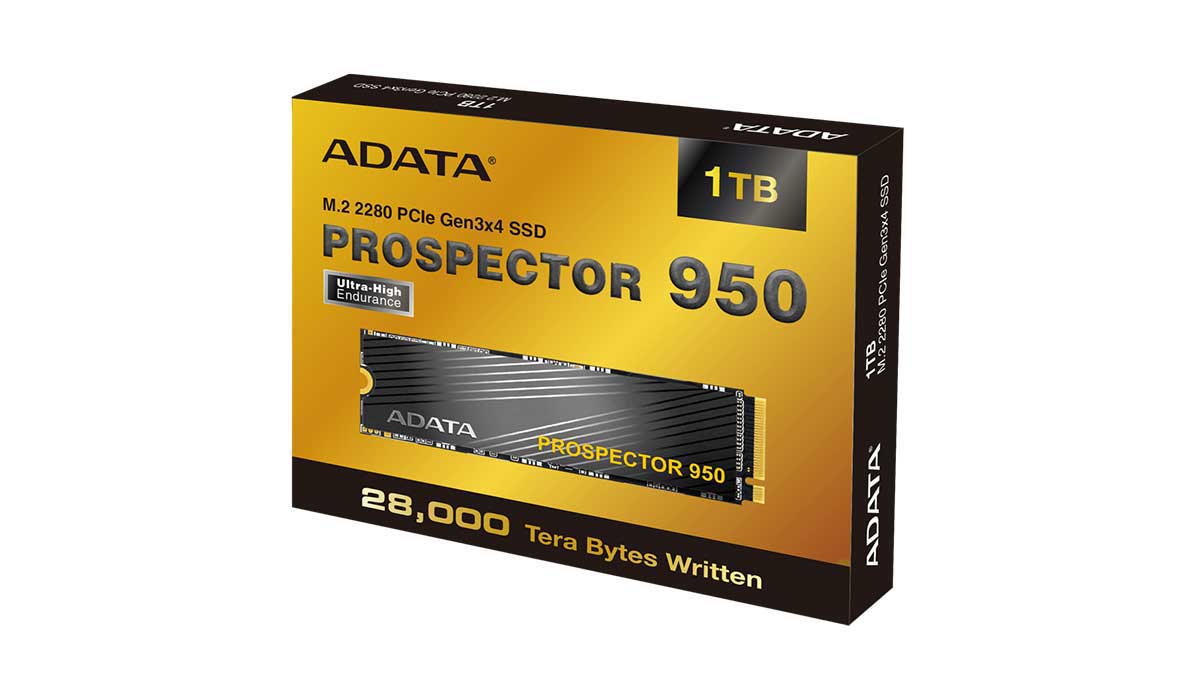ADATA Prospector 950

ADATA
The ADATA PROSPECTOR 950 is currently being tested in our review, so will these units provide a premium user experience even if they were originally intended to mine Chia cryptocurrency?
Quick info
- Manufacture: ADATA
- Unit name: PROSPECTOR 950
- Storage capacity: terabytes
- Interface: PCIe 3.0
- Size: M.2 2280
The SSDs that work with the NVMe protocol on the third generation PCIe interface are still steadfast and we cannot deny this in any way. These units still offer good value for money, especially for those who use them with games. For gamers, the importance of the fourth generation is less than the third due to the price factor and the difference in download speeds is not so great, and we do not know how they will deal with the fifth generation when we see it with the new generations soon.
But what we know today at least is that we will be dealing with a unit that comes from the third generation that we see is still maintaining its position in the market at the moment, and this unit comes to us from ADATA in its new product lines. Let’s welcome the new PROSPECTOR 950 with a capacity of terabytes.
Before all that, let’s talk quickly about this ADATA PROSPECTOR series. This series was originally made for the famous Chia coin implants, which have given investors no return in most cases and are currently in a state of clinical death.
Why is it ideal for this purpose? Because it withstands a very large write capacity compared to the rest of the units in the market in the same class, this is what is important to ensure that the storage unit works for the longest period while this unit is drained. Does this mean that we will review it on the grounds that it is a unit designed for numerical units? of course not.
What we will do is review this unit under normal conditions of consumption only as we review any unit of storage. Let’s start our journey with her!
A complete look at the unit
This unit is very similar to the units we’ve seen from the Gammix series from the same manufacturer. The volume is topped by a metallic diffuser that lacks any of the RGB or bright color aesthetics you’d expect to see on higher XPG units. The design is also closer to the third-generation units that we saw this year from the Falcon series, with a dark gray diffuser with some simple lines that adorn it.
There is no need, on paper, for a giant heatsink as we saw with 4th generation PCIe units because 3rd generation units don’t emit as high thermal power as we saw with 4th generation. The diffuser comes on top of the main unit which comes in black as usual ADATA with its NVMe units. A design expected in this category if you ask us and there is not much to talk about at this point.
As for the technical specifications that seem somewhat strange for the SSD market in this category, what we will get with this unit is very normal speed for its interface. The speed of 3500 MB per second for reading data and 3000 MB for writing consumes the entire PCIe interface in its third generation, and these speeds are considered among the highest on the level of this interface.
As for random read and write speeds, on the reading side, we get a speed of 300K at the same time that we get a speed of 240K with writes. All of this is done through a hidden SLC memory with the internal DRAM of this memory, but for the rest of the features offered by this unit, there is a lot more.
Your data is safe, and redeemable forever
The new module provides the ability to debug through LDPC technologies and can be encrypted through AES 256 encryptions. These features are absent from some of the modules we saw previously, and since PROSPECTOR modules are designed to work on data mining, it was necessary to provide these technologies for better data integrity.
You will know that these units are designed to be hard on when you look at the data that can be written. For the PROSPECTOR 950 SSD, you can write up to 28,000 TB on this unit. If you want a reference for how powerful it is, you can look at a unit like the Samsung 980 Pro that comes with a 4G interface and can only write 1200 TB while working with you.
This is all great on paper, but when you translate it into performance….
Performance tests
Tested in this environment:
Test device specifications:
- Processor: AMD Ryzen 9 5950X.
- Motherboard: MSI X570 Godlike.
- Memory: Corsair Dominator Platinum 4x8GB 3600MHz.
- Storage disk: ADATA PROSPECTOR 950.
- Power Supply: DeepCool Gamer Storm DQ850-M.
- CPU Heat Sink: NZXT Kraken X73.
Test conditions:
- Using Windows 10 Pro.
- Using the M.2 PCIe port of the X570 chip directly.
- Activate the Windows Write Cache feature.
- Working on the High-Performance power system within the operating system.
Let’s start with the performance. The performance of this unit is arguably better when we tested the read and write speeds, because this unit scored up to 3,685MB/s read and 2,966MB/s written on Crystal Disk Mark tests. For the ATTO Disk tests, it recorded 3,031MB reading and 2,171MB writing per second.
As for temperatures, we can’t say they’re ideal for 3G units. The temperature reached 52 degrees Celsius at the same time that we saw units that did not break the 48 degrees Celsius barrier, but these degrees are not catastrophic either, they are reasonable because they do not affect performance.
Final verdict
The speeds are excellent, the secondary features are great, and the rigidity is the title of this unit. Shall we recommend it to you? No. Not if you are a regular user or content creator because this unit is much more expensive than you think. $800 can buy you three of the best SSDs we’ve seen in the fourth generation of PCIe with the same capacity, so we can’t say that these units are for the average user.
Even for Chia coins that no one will return at the moment due to the catastrophe in terms of price drop, there is no advantage to obtaining these units because whoever will return them will not get a profit margin that they can think of in the first place. These units will be recommended for anyone who owns NAS devices or monitoring systems that need access to data at high speed and also need a unit that is reliable for long periods of time.
We don’t fault the features of the unit at all, no. Even its price is reasonable for what this unit offers, but what it does is simply not for you. Gamers or content creators won’t need to write 28,000 TB over this unit’s five-year warranty period, but the normal rates are quite enough for their use.
If you’re not going to read all of this, all we can say is that this unit is excellent, but the solidity it offers for the price is not for you “regular” user.
ADATA Prospector 950 rating
- Performance: 9
- Hardness: 10
- Accessories and Insurance Techniques: 9
- Price: 5
- Temperature: 8
Positives
- Take advantage of all that the interface offers.
- Security and encryption technologies are fully in place.
- The best possible rigidity of the SSD unit.
Negatives
- Unsuitable price for the average consumer.







